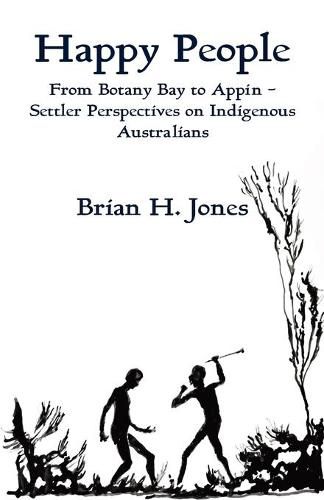Readings Newsletter
Become a Readings Member to make your shopping experience even easier.
Sign in or sign up for free!
You’re not far away from qualifying for FREE standard shipping within Australia
You’ve qualified for FREE standard shipping within Australia
The cart is loading…






Less than sixty years after the ships of the First Fleet arrived in Sydney Cove, John Eyre wrote that Indigenous Australians were ‘strangers in their own land’. Also, he wrote that ‘hungry, and famished, they wander about begging’. How did the lives of Indigenous Australians deteriorate so quickly?
With this question in mind, Happy People traces the perspectives of settlers on Indigenous Australians, from the first settlement during 1788 until the military excursions and Governor Macquarie’s ‘emergency’ measures put a forceful and localised end to the conflict on the southern border of the colony during 1816-17. Happy People shows how the settler’s first perspectives were complex mixes of aversion to the ‘savagery’ of the Indigenous people, refusal to recognise the reality of Indigenous resistance to the land theft that was taking place, curiosity about the new and ‘exotic’ culture, and recognition of individuality and personality of leading Indigenous figures. Although there was a temporary ‘rapprochement’ between the colonists and some of the Indigenous people of the Harbour region when Bennelong came to an understanding with Governor Phillip, within a short time the settler perspective hardened to viewing Indigenous people as little more than annoying, unappealing obstacles to colonial expansion and land possession, and as threats to individual security. By 1816-17, the dominant settler views were that Indigenous people should either be eliminated as obstacles, or subjugated, domesticated, and ‘civilised’.
$9.00 standard shipping within Australia
FREE standard shipping within Australia for orders over $100.00
Express & International shipping calculated at checkout
Less than sixty years after the ships of the First Fleet arrived in Sydney Cove, John Eyre wrote that Indigenous Australians were ‘strangers in their own land’. Also, he wrote that ‘hungry, and famished, they wander about begging’. How did the lives of Indigenous Australians deteriorate so quickly?
With this question in mind, Happy People traces the perspectives of settlers on Indigenous Australians, from the first settlement during 1788 until the military excursions and Governor Macquarie’s ‘emergency’ measures put a forceful and localised end to the conflict on the southern border of the colony during 1816-17. Happy People shows how the settler’s first perspectives were complex mixes of aversion to the ‘savagery’ of the Indigenous people, refusal to recognise the reality of Indigenous resistance to the land theft that was taking place, curiosity about the new and ‘exotic’ culture, and recognition of individuality and personality of leading Indigenous figures. Although there was a temporary ‘rapprochement’ between the colonists and some of the Indigenous people of the Harbour region when Bennelong came to an understanding with Governor Phillip, within a short time the settler perspective hardened to viewing Indigenous people as little more than annoying, unappealing obstacles to colonial expansion and land possession, and as threats to individual security. By 1816-17, the dominant settler views were that Indigenous people should either be eliminated as obstacles, or subjugated, domesticated, and ‘civilised’.